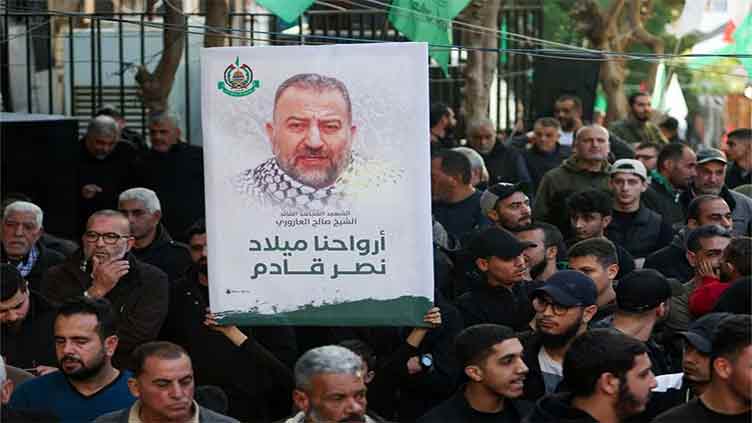Killing of Arouri sends menacing message to Hamas chiefs, may hamper truce effort

World
Killing of Arouri sends menacing message to Hamas chiefs, may hamper truce effort
CAIRO/BEIRUT/DUBAI (Reuters) - The killing of a Hamas chief in Lebanon removes a big name from Israel’s most-wanted list but could drive the Palestinian group's exiled leaders deeper into hiding, hampering efforts to negotiate further Gaza ceasefires and hostage releases.
Hamas deputy leader Saleh al-Arouri was struck down by a drone in the southern suburbs of Beirut, the stronghold of Hamas' Iranian-backed Lebanese ally Hezbollah, in an attack widely attributed to Hamas' sworn foe Israel.
Israel has not confirmed or denied a role, but the attack came a month after Israeli broadcaster Kan aired a recording of the head of Israel's domestic security agency Shin Bet vowing to hunt down Hamas in Lebanon, Turkey and Qatar even if took years.
On Wednesday, Israel's Mossad spy chief David Barnea said he was committed to "settling the score" with Hamas, adding: "Let every Arab mother know that if her son took part, directly or indirectly, in the October 7 massacre, his blood is forfeit."
Arouri's killing, said Ashraf Abouelhoul, managing editor of Egypt's Al-Ahram daily and an expert in Palestinian affairs, "may push Hamas to harden its stance so it doesn’t look as if it is bowing under pressures or threats of more assassination."
The stakes are high both for the two million Palestinians trying to survive Israeli bombardment in Gaza and for Israeli hostages held there by Hamas, ruler of the coastal territory and like Hezbolah an ally of Iran.
Hamas negotiators including Arouri had been in Qatar-mediated talks with Israel over a possible further ceasefire in the war and prospects for further releases of Israeli hostages.
As recently as the past week the two sides were having discussions with Qatari mediators on a truce and hostages, a source familiar with the talks said, indicating a period when the Arouri strike may have been in final stages of preparation.
Security concerns may now complicate matters, analysts said.
Mohanad Hage Ali, deputy director for research at the Malcolm H. Kerr Carnegie Middle East Center in Beirut, said that in recent years Palestinian groups operating in Lebanon, where Hezbollah is a powerful player, had become used to a measure of security. Hamas needed to be far more cautious now, he added.
'OPEN BATTLE'
Such groups, he said, had been "happy with the arrangements in place – some quiet and stability and some sort of deterrence by Hezbollah. This has flown out of the window, given Oct. 7 and the conflict in south Lebanon and how things are going forward."
Arouri, 57, was the first senior Hamas political leader to be assassinated outside the Palestinian territories since Israel vowed to eliminate the group following its Oct.7 rampage, when it killed 1,200 people and took 240 hostages back to Gaza.
The loss of a top figure could now prompt Hamas to take a tougher line against Israel, currently waging a shattering air and ground offensive against the group, analysts told Reuters.
The extent of any change in Hamas' stance remains unclear.


